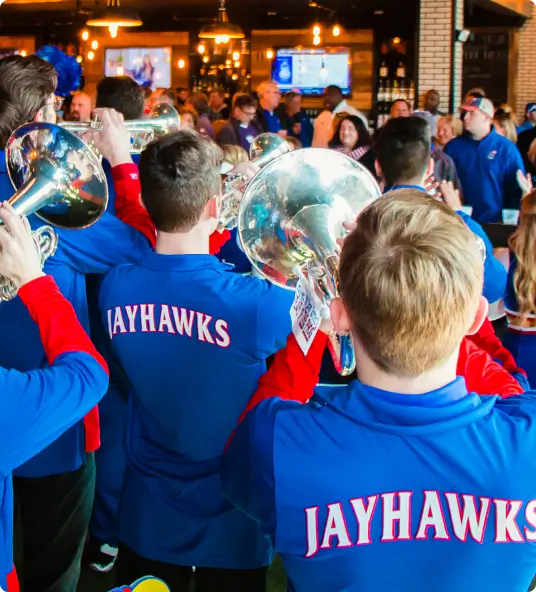Jayhawks in leadership positions are everywhere you look, including through the Jayhawk Career Network. KU Alumni, in partnership with SumnerOne, is highlighting Jayhawk leaders who are models for others in their industries with our “Copy the Leader” program.
What do you do in your work?
I work in Blue Origin’s New Shepard Program, specifically flight operations. My career started out in space flight operations when my first role was as a flight controller for the International Space Station at Johnson Space Center. After several years, I left the space industry and pursued project management and business management roles and completed my MBA at the University of Kansas in this period between space careers. I ended up coming back to the space industry with Blue Origin when I found a great new role that was a perfect blend of my experiences in and out of spaceflight operations.
The flight operations team is responsible for launching the New Shepard space vehicle. Outside of a typical flight campaign, my role is to coordinate the work of our operations products such as procedures, commanding scripts, and display panels and to ensure that they are published at the correct milestones so that we are ready to support upcoming flights. Another key part of my role is leading projects that improve not only our tools and processes, but also how we operate between and during critical launch campaigns. Within a launch campaign the whole team focuses their undivided attention on the flight at hand. I typically fill anywhere needed during these high intensity periods as it takes a large team with varied and collectively complex skill sets to launch and recover a rocket like the New Shepard vehicle. It has been truly amazing to get an opportunity to see our entire launch day from the moment we roll the rocket out to the launch pad all the way through its flight. Even the recovery operations of both the crew capsule and propulsion module are exciting to be a part of despite them not being the types of things that typically make it into the news.
What are the qualities of a good leader?
One of the earliest leadership qualities I learned in my career was learning when to commit to and support a decision even if I did not necessarily agree with it initially. I’ve learned that an indication of a healthy team is one that can have an active discussion and debate about a decision that needs to be made while being respectful and pragmatic about how different dimensions of the decision are understood by each team member. Each team member brings a diverse background, lived experience, and knowledge to the table that can contribute to the team’s ability to develop the best solution to a problem. A leader should constantly and actively engage the team and ask questions that help them work towards productive consensus and ideally, the best solution. At the same time, a leader must also understand that the pathway forward that they might have chosen without valuable contributions from the experts on the team is not always the best way forward, too. Setting egos and pride aside for a better outcome is always the right move.
How do you practice leadership at your job?
I work with people from all across our organization and from various locations around the globe and I often joke that if I only try to get in contact with you because I need you to do something, it’s because I need something. The only way I can be successful in my role is to constantly improve and evolve my interpersonal communication skills. Most importantly, It’s critical that I always focus on building great working relationships and being genuine in the conversations I have with my colleagues. My intent is to never have one way conversations, but to be an active listener as well.
What makes a team or group successful?
A team that allows the admission of errors and mistakes and is willing to learn from them will be successful, in my experience. I work with amazingly intelligent people and the solutions to the problems we solve individually and as teams are not always straightforward. In my line of work mistakes can be very costly but when I see an issue and speak up, it informs the team about the potential impact and allows us to correct the mistake before it causes problems. This openness and shared accountability helps us to be more successful in all of our projects and operations. Throughout my career I have authored procedures and commanding scripts and have worked hard to be very technically competent. We often underwent very rigorous reviews and verifications, but that never meant that the products or procedures were perfect or at risk of any type of error. Whenever I found an issue, I let the team know as soon as possible and we would then work through it to meet our goals. This created trust and openness amongst my colleagues which then led to a more successful team over time.
How have you adapted to the changes brought by the pandemic in your work?
The most difficult part of the pandemic for me was that I could not simply have a five minute conversation with a colleague in the hallway or at our desks as social distancing and working remotely changed how so many of us did our work, at least temporarily. Obviously there were technological solutions designed to help us work remotely and connect us via video and audio, but I felt that the more casual and unplanned office conversations were not happening and it was increasingly difficult to keep my finger on the pulse of the problems that arose. I learned that in order to help the team, I needed to be more direct and more proactive as a leader. We scheduled a recurring stand-up meeting every few days to communicate issues sooner, and I also made sure I was available for questions, quick chats, and problem solving sessions outside that time. I reinforced with my team that they did not always need to wait for a formal meeting when they faced hurdles throughout, and that sometimes a connection as simple as a message over chat would work just fine. I made a conscious effort to address issues as I learned about them and to follow-up promptly if I could not find a resolution immediately. Even as we are returning to the office more frequently, this has been a useful approach as our team is spread out across multiple sites and buildings as we support many different functions of the organization.
Want to receive alumni and career stories like this in your inbox? Subscribe to the Water Cooler, a monthly career newsletter for alumni, students and friends. It includes upcoming events, featured mentors, stories about alumni and students, jobs and more.




